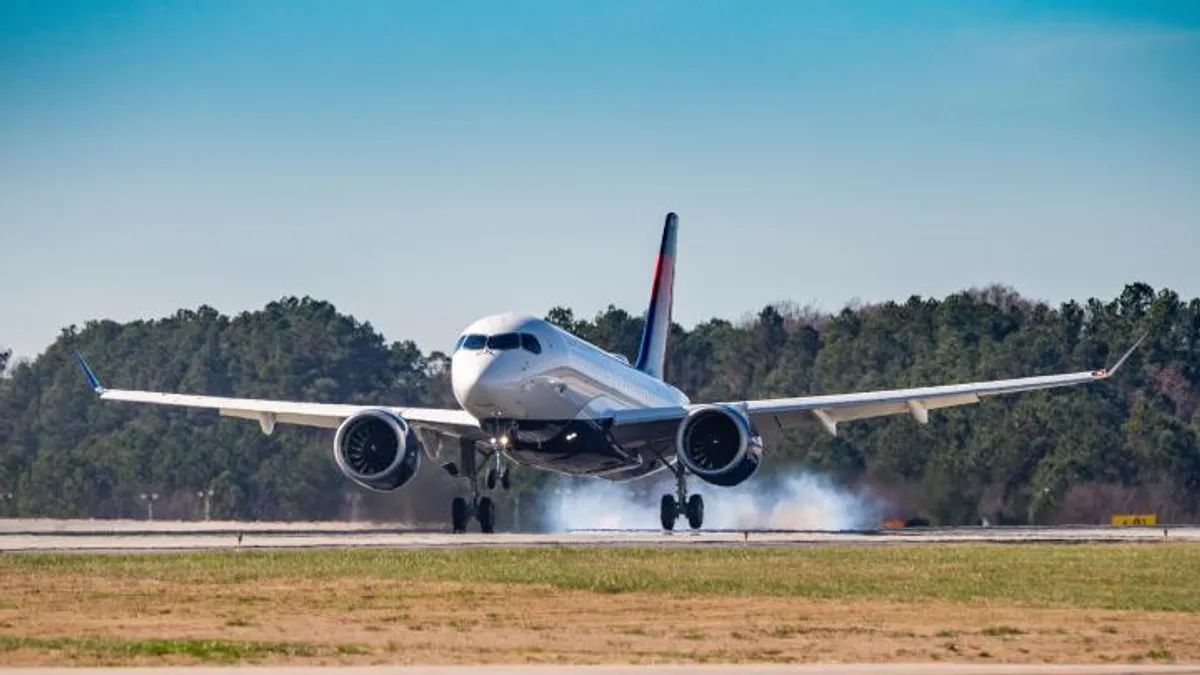Dive Brief:
- A former Delta flight attendant who sued for retaliation under the New York City Human Rights Law can’t pursue the case because she failed to demonstrate a reasonable belief that Delta mishandled a passenger’s racial remark, the 2nd U.S. Circuit Court of Appeals held (Leroy v. Delta Air Lines, No. 21-267 (2nd Cir. Oct. 21, 2022)).
- Before the plane took off, the flight attendant allegedly heard a disgruntled passenger call her a racially derogatory slur, according to the 2nd Circuit. In the lawsuit, she alleged that when she reported it to the captain, he told her to step onto the bridge with the passenger and demanded her removal after she refused. A few days later, at her supervisor’s direction, she submitted an official incident report. However, she included facts not in the lawsuit. In particular, she wrote that the passenger complained first and when the captain asked if she wanted to resolve the situation, she told him it had been resolved. She also wrote that she assured management she was “very ok.” Delta fired her two months later, and she sued for retaliation.
- The lawsuit was properly dismissed, the 2nd Circuit held. To state a cause of action for retaliation, it had to allege facts indicating the flight attendant had a good faith, reasonable belief the employment action she was opposing was unlawful, the panel explained. The lawsuit failed to do so. First, there was no indication Delta acted unlawfully, either by allowing or facilitating the slur or because of the captain’s response, the 2nd Circuit explained. Second, it failed to indicate the flight attendant reasonably believed Delta’s actions were unlawful.
Dive Insight:
The case spotlights a few legal basics: At the forefront, employers — including front-line supervisors — may not retaliate against an employee for reporting suspected discrimination or harassment. Work-related threats, warnings or reprimands are examples of possible retaliatory actions, according to guidance by the U.S. Equal Employment Opportunity Commission. A supervisor’s hostility or indifference to harassment complaints can also be retaliatory, the 2nd Circuit noted. However, only individuals “who act with a reasonable good faith belief” that the conduct they’re opposing is unlawful are protected, the guidance says.
The case also touched on a second legal basic: The customer is not always right, as an EEOC attorney recently told HR Dive. Title VII of the Civil Rights Act of 1964 and comparable local and state laws prohibit employers from acquiescing to a customer’s discriminatory preferences or conduct.
The passenger’s racial slur was not, in itself, a discriminatory employment practice, the 2nd Circuit pointed out. To determine whether an employer, such as Delta, could be liable for such conduct, courts look to whether the employer exercised a high level of control over the customer (or passenger), whether its negligence “permitted or facilitated” the conduct, how quickly it responded and the appropriateness of its response, the panel explained.
In this case, the lawsuit failed to allege that Delta fell short on any of these factors, the court said. For example, there were no allegations that Delta failed to monitor the workplace, respond to employee complaints or provide a way for them to complain, or that it discouraged complaints from being filed.
The allegations also indicated that Delta’s response was appropriate, the panel said. The airline was obligated only to address and end the passenger’s harassment, and that obligation was met, it said.
The ruling highlights a best practice as well: timely documentation of workplace incidents. Two days after the incident, the flight attendant’s supervisor instructed her to fill out a report, the 2nd Circuit noted. She referenced the report in her lawsuit, admitted she prepared it and didn’t contest its authenticity. It was therefore central to her allegations because it gave her the opportunity to detail what happened, the court said.













